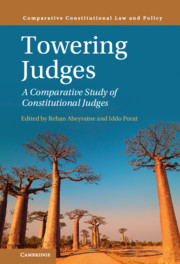Book contents
- Towering Judges
- Comparative Constitutional Law and Policy
- Towering Judges
- Copyright page
- Dedication
- Contents
- Acknowledgements
- Contributors
- Introduction: Towering Judges – A Conceptual and Comparative Analysis
- 1 Towering Judges and Global Constitutionalism
- 2 The Landscapes that Towering Judges Tower Over
- 3 Sir Anthony Mason: Towering Over the High Court of Australia
- 4 Lady Hale: A Feminist Towering Judge
- 5 Hugh Kennedy: Ireland’s (Quietly) Towering Nation-Maker
- 6 Judicial Rhetoric of a Liberal Polity: Hong Kong, 1997–2012
- 7 Judicial Minimalism as Towering: Singapore’s Chief Justice Chan Sek Keong
- 8 Nepal’s Most Towering Judge: The Honourable Kalyan Shrestha
- 9 Barak’s Legal Revolutions and What Remains of Them: Authoritarian Abuse of the Judiciary-Empowerment Revolution in Israel
- 10 PN Bhagwati and the Transformation of India’s Judiciary
- 11 Justice Cepeda’s Institution-Building on the Colombian Constitutional Court: A Fusion of the Political and the Legal
- 12 A Towering but Modest Judicial Figure: The Case of Arthur Chaskalson
- 13 Chief Justice Sólyom and the Paradox of “Revolution under the Rule of Law”
- 14 The Socialist Model of Individual Judicial Powers
- 15 The Civil Law Tradition, the Pinochet Constitution, and Judge Eugenio Valenzuela
- 16 Towering versus Collegial Judges: A Comparative Reflection
- Appendix
- Index
3 - Sir Anthony Mason: Towering Over the High Court of Australia
Published online by Cambridge University Press: 25 March 2021
- Towering Judges
- Comparative Constitutional Law and Policy
- Towering Judges
- Copyright page
- Dedication
- Contents
- Acknowledgements
- Contributors
- Introduction: Towering Judges – A Conceptual and Comparative Analysis
- 1 Towering Judges and Global Constitutionalism
- 2 The Landscapes that Towering Judges Tower Over
- 3 Sir Anthony Mason: Towering Over the High Court of Australia
- 4 Lady Hale: A Feminist Towering Judge
- 5 Hugh Kennedy: Ireland’s (Quietly) Towering Nation-Maker
- 6 Judicial Rhetoric of a Liberal Polity: Hong Kong, 1997–2012
- 7 Judicial Minimalism as Towering: Singapore’s Chief Justice Chan Sek Keong
- 8 Nepal’s Most Towering Judge: The Honourable Kalyan Shrestha
- 9 Barak’s Legal Revolutions and What Remains of Them: Authoritarian Abuse of the Judiciary-Empowerment Revolution in Israel
- 10 PN Bhagwati and the Transformation of India’s Judiciary
- 11 Justice Cepeda’s Institution-Building on the Colombian Constitutional Court: A Fusion of the Political and the Legal
- 12 A Towering but Modest Judicial Figure: The Case of Arthur Chaskalson
- 13 Chief Justice Sólyom and the Paradox of “Revolution under the Rule of Law”
- 14 The Socialist Model of Individual Judicial Powers
- 15 The Civil Law Tradition, the Pinochet Constitution, and Judge Eugenio Valenzuela
- 16 Towering versus Collegial Judges: A Comparative Reflection
- Appendix
- Index
Summary
Two High Court chief justices may be considered candidates for the title of 'Australia’s Towering Justice’: Sir Owen Dixon and Sir Anthony Mason. Dixon’s claim to the title lies in his articulation of a formalistic doctrinal methodology – ‘Dixonian legalism’ – which held firm for decades. Mason’s claim lies in his unshackling of the Court from legalism, and his reconceptualising of the Court’s role within the Australian system of government. This heralded a form of realism that led to the development of doctrines, some first propounded by Dixon himself, that would progress individual liberties and democratic participation in a constitutional system lacking comprehensive rights protections. This chapter claims that Mason’s legacy is the most important today. His Court’s methodological realism and explicit acknowledgement of values and policy in judicial decision-making, and the doctrinal development that gave the Australian ‘people’ constitutional status and protections, all continue to shape modern constitutional law and debates over the judicial role and method. It is against Mason and the jurisprudence of his Court that modern legalists must now define – and defend – themselves.
- Type
- Chapter
- Information
- Towering JudgesA Comparative Study of Constitutional Judges, pp. 56 - 77Publisher: Cambridge University PressPrint publication year: 2021



